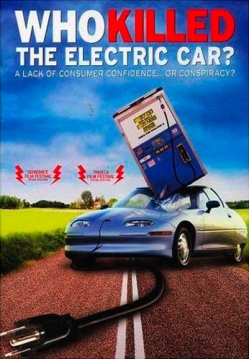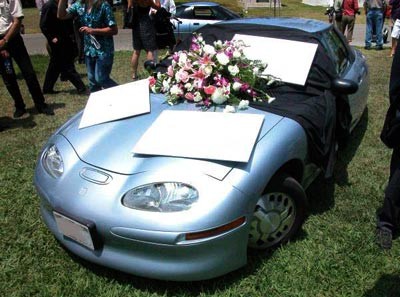
Is General Motors being haunted by the revenge of the electric car? (movie: who killed the electric car?). In 1996, electric cars began to appear on roads all over California. They were quiet and fast, produced no exhaust, and ran without gasoline. Ten years latter, these futuristic cars were almost entirely gone. What happened? Why should we be haunted by the ghost of the electric car? And, who killed the electric car?
“Who Killed the Electric Car?” was a 2006 documentary film that explored the creation, limited commercialization, and subsequent destruction of the battery electric vehicle in the United States, specifically the General Motors EV1 of the 1990s. The film explores the roles of automobile manufacturers, the oil industry, the US government, the Californian government, batteries, hydrogen vehicles, and consumers in limiting the development and adoption of this technology.
Who knew then that the revenge of the electric car will come back to haunt General Motors– just three years after this documentary disclosed the truth of these atrocious and selfish acts which deprived all of us of clean energy cars.
The documentary Who Killed the electric car? [watch free movie] was released on DVD to the home video market on November 14, 2006 by Sony Pictures Home Entertainment.
The movie deals with the history of the electric car, its development and commercialization, mostly focusing on the General Motors EV1, which was made available for lease in Southern California, after the California Air Resources Board passed the ZEV mandate in 1990, as well as the implications of the events depicted for air pollution, environmentalism, Middle East politics, and global warming.
The film details the California Air Resources Board’s reversal of the mandate after lawsuits from automobile manufacturers, the oil industry, and the George W. Bush administration. It points out that Bush’s chief influencers, Dick Cheney, Condoleezza Rice, and Andrew Card, are all former executives and board members of oil and auto companies. Therefor, the EV1 was eliminated from the GM Line in 1999.
A large part of the film accounts for GM’s efforts to demonstrate to California that there was no demand for their product, and then take back every EV1 and dispose of them.
A few EV1s were disabled and given to museums and universities, but almost all were found to have been crushed; GM never responded to the EV drivers’ offer to pay the residual lease value ($1.8 million was offered for the remaining 78 cars in Burbank before they were taken back and crushed). In California, several activists were arrested during the protests who were attempting to block the GM car carriers taking the remaining EV1s off to be crushed.
The film deeply explores some of the reasons the auto and oil industries worked together to kill off the electric car. Wally Rippel is shown explaining that the oil companies were afraid of losing out on trillions in potential profit from their transportation fuel monopoly over the coming decades, while the auto companies were afraid of losses over the next six months of EV production. Others explained different stories and reasons for killing the electric car. GM spokesman Dave Barthmuss argued it was lack of consumer interest due to the maximum range of 80-100 miles per charge, and the relatively high price.
The film also showed the failed attempts by electric car enthusiasts trying to combat the cancellation of EV1 and the surviving vehicles. Towards the end of the film, a deactivated EV1 car #99 was found in the garage of Petersen Automotive Museum, with its former owner invited for a visit.
The film also explores the future of automobile technologies including a deeply critical look at hydrogen vehicles and an upbeat discussion of plug-in hybrid electric vehicle technologies, with examples such as Tesla Roadster. The end of the film mentioned the upcoming sequel entitled Revenge of the Electric Car.
Celebrities who protested the destruction of the electric car.
 The film features interviews with celebrities who drove the electric car, such as Mel Gibson, Tom Hanks, Alexandra Paul, Peter Horton, Ed Begley, Jr., a bi-partisan selection of prominent political figures including Ralph Nader, Frank Gaffney, Alan Lloyd, Jim Boyd, Alan Lowenthal, S. David Freeman, and ex-CIA head James Woolsey, as well as news footage from the development, launch and marketing of EVs.
The film features interviews with celebrities who drove the electric car, such as Mel Gibson, Tom Hanks, Alexandra Paul, Peter Horton, Ed Begley, Jr., a bi-partisan selection of prominent political figures including Ralph Nader, Frank Gaffney, Alan Lloyd, Jim Boyd, Alan Lowenthal, S. David Freeman, and ex-CIA head James Woolsey, as well as news footage from the development, launch and marketing of EVs.
The film also features interviews with some of the engineers and technicians who led the development of modern electric vehicles and related technologies, such as Wally Rippel, Chelsea Sexton, Alec Brooks, Alan Cocconi and Stan and Iris M. Ovshinsky and other experts, such as Joseph J. Romm (author of Hell and High Water and The Hype about Hydrogen). Romm gives a presentation intended to show that the government’s “hydrogen car initiative” is a bad policy choice and a distraction that is delaying the exploitation of more promising technologies, like electric and hybrid cars that could reduce greenhouse gas emissions and increase America’s energy security. Also featured in the film are spokesmen for the automakers, such as GM’s Dave Barthmuss, a vocal opponent of the film and the EV1, and Bill Reinert from Toyota.
Today, General Motors Corp. bankruptcy filing seemed inevitable after a rebellion by its bondholders forced it to withdraw on Wednesday a plan to swap bond debt for company stock.
“Its pay back baby,” said the electric car 🙂
____________________________________________________
PHOTOS EV1 GM CARS
See a photo gallery EV1 cars protest against General motors for crashing and killing the electric cars, which were taken from the people who drove and loved them.


.

Bankruptcy looms for GM; Chrysler awaits fate
AP – 1 hr 18 mins ago DETROIT – General Motors Corp. has pulled together many of the pieces needed to complete government-ordered restructuring, but its board still is likely to decide Saturday to head into bankruptcy protection because there’s too much left to do. Full Story»

6 thoughts on “General Motors Haunted by the Ghost of the Electric Car EV1”
Hi, cool post. I have been wondering about this topic,so thanks for writing.
I really like your post.
I think I will try to recommend this post to my friends and family, cuz it’s really helpful.
well, i have to say i’m not in agreement with these conclusions, but i like your viewpoint. this subject has too many variables and false info in the market that i do not know what to believe. i guess it’s a matter of being informed.
You know, I don’t read blogs. But yours is really worth beeing read.
Hello. I think the article is really interesting. I am even interested in reading more. How soon will you update your blog?